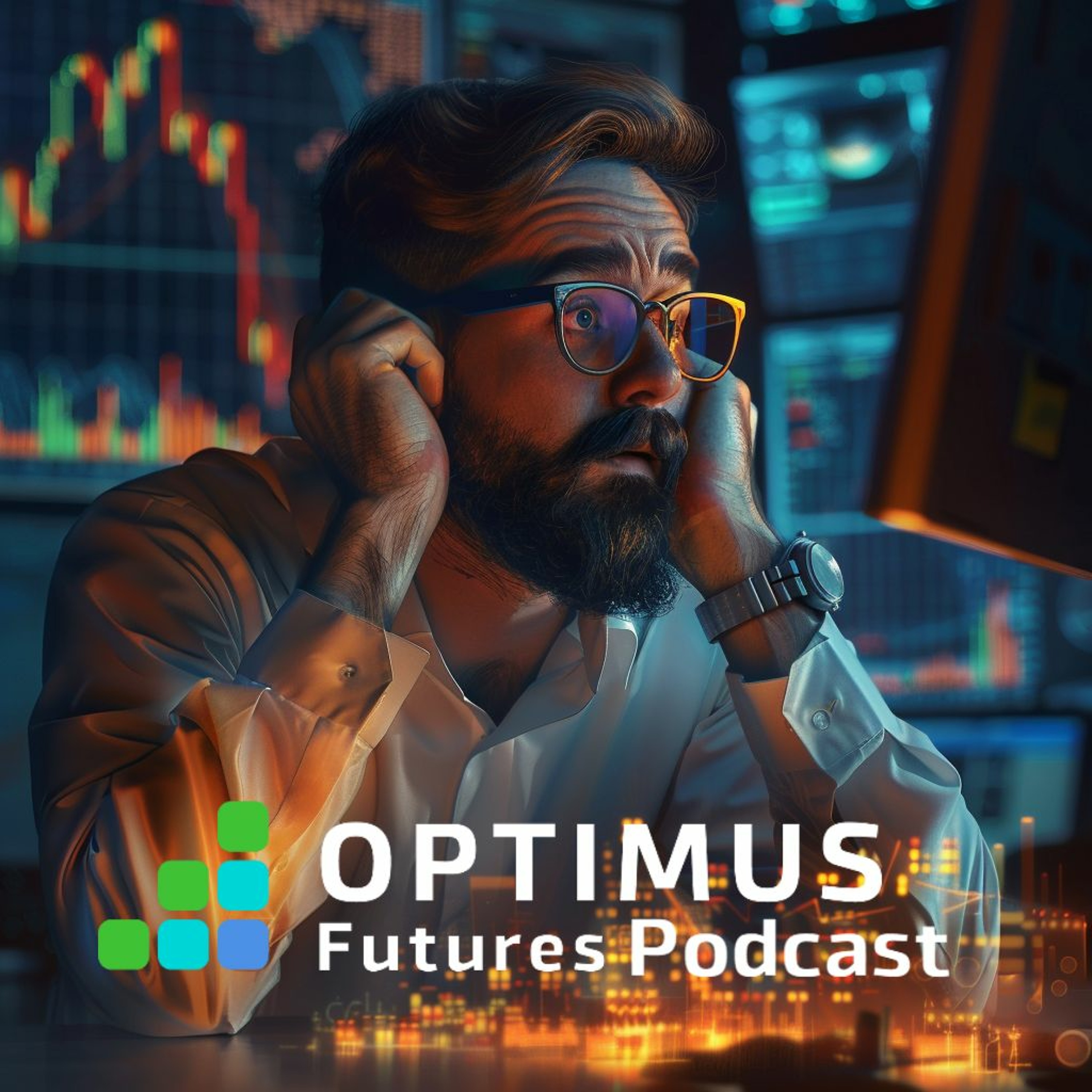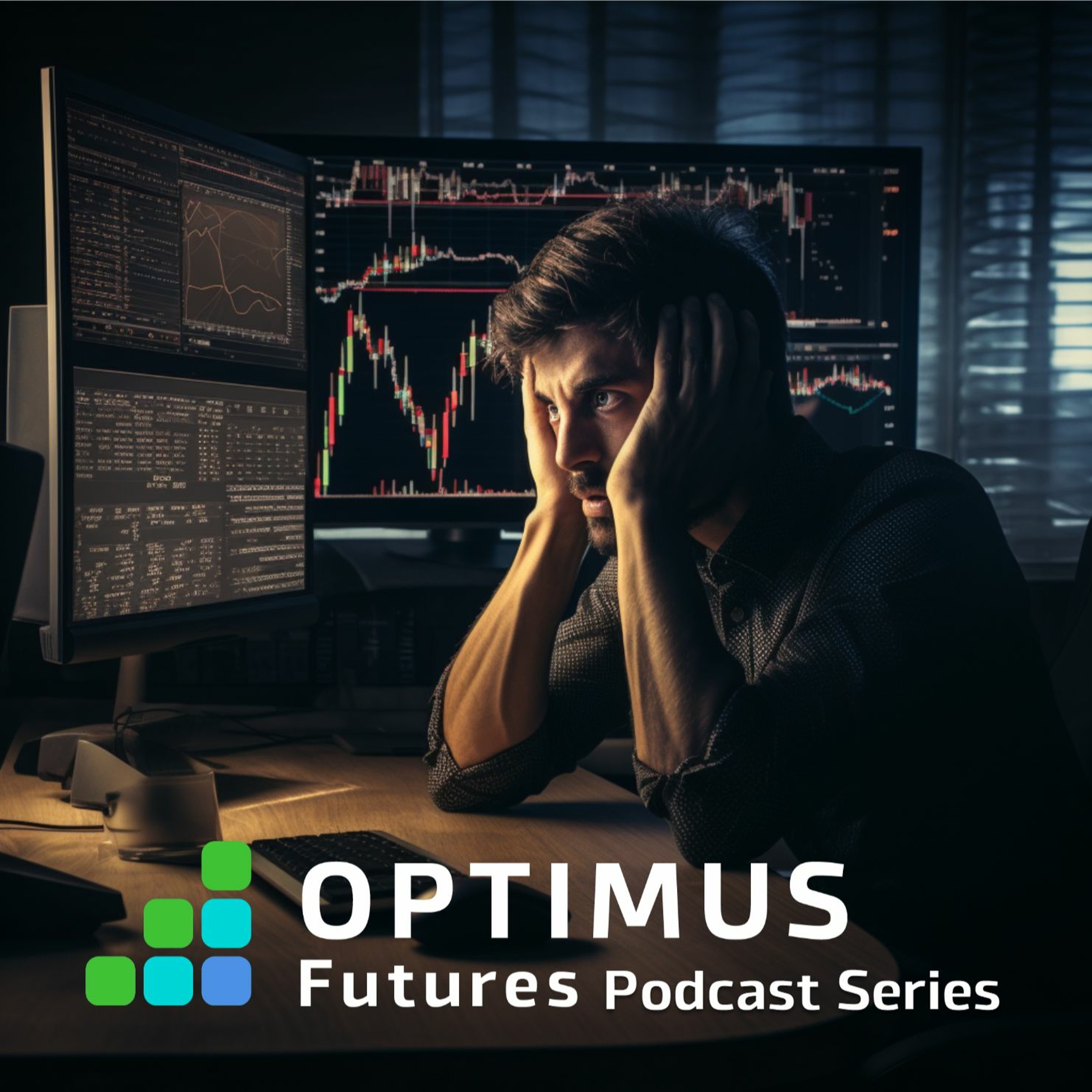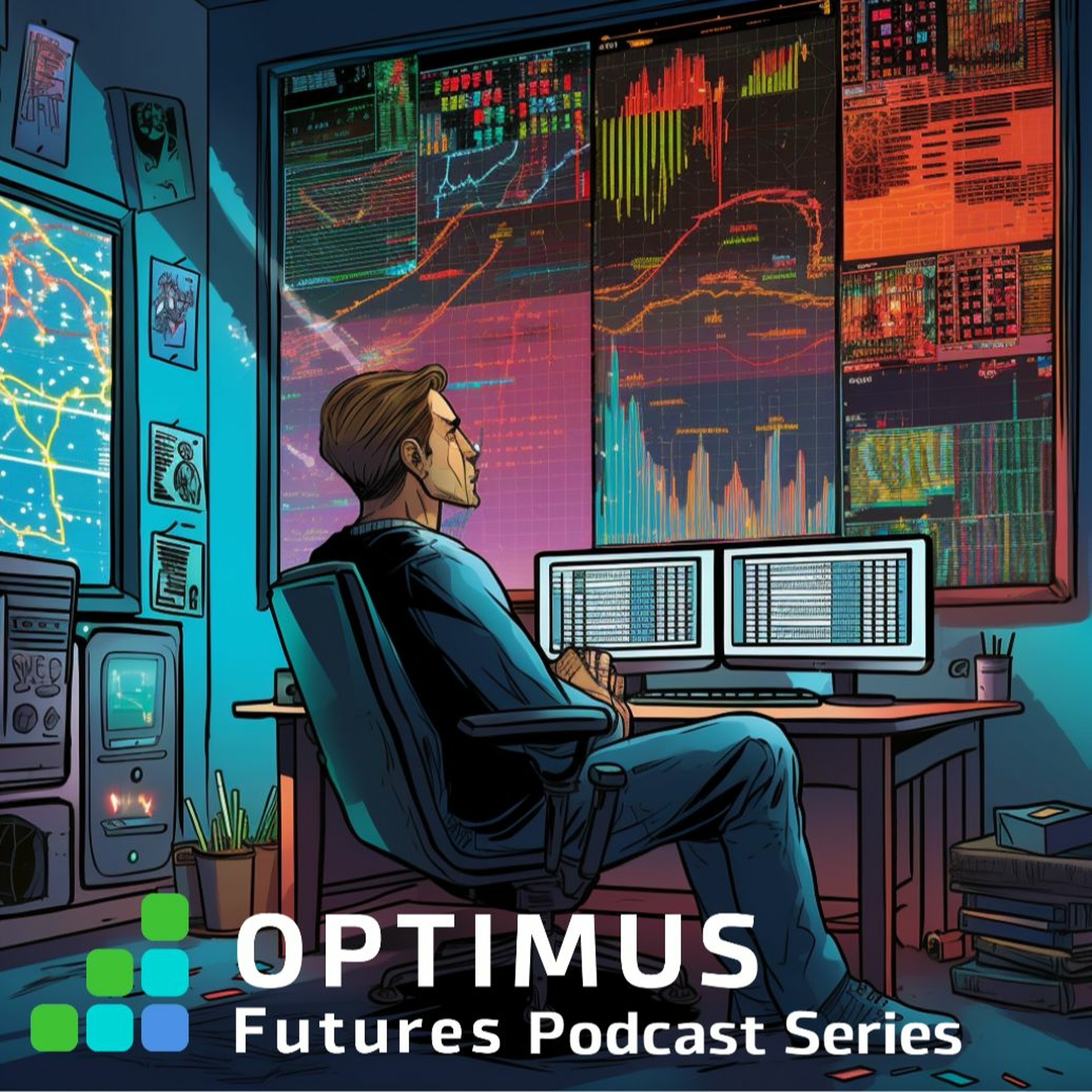Discover Optimus Futures Trading Tips & Strategies
Optimus Futures Trading Tips & Strategies

Optimus Futures Trading Tips & Strategies
Author: Optimus Futures
Subscribed: 112Played: 2,442Subscribe
Share
© All rights reserved
Description
Listen to real, practical and implementable trading tips, ideas and strategies from experienced traders.
There is a substantial risk of loss in futures trading. Past performance is not indicative of futures results.
There is a substantial risk of loss in futures trading. Past performance is not indicative of futures results.
130 Episodes
Reverse
Discover the unconventional day trading principle that could potentially revolutionize your approach and may help you avoid catastrophic losses.
In this episode of Everything Futures, we explore the inversion principle, a rarely used technique that challenges conventional wisdom and offers a unique perspective on risk management, emotional control, and strategy development.
Trading futures and options involves substantial risk of loss and is not suitable for all investors. Past performance is not necessarily indicative of future results. The risk of loss in trading commodity interests can be substantial. You should therefore carefully consider whether such trading is suitable for you in light of your financial condition.
In this thought-provoking podcast, we explore the fundamental conflict between our inherent DNA and the counterintuitive strategies required for success in the trading world.
Join us as we delve into the concept of "trading human tendencies" and how our natural instincts often work against us in the market. We'll discuss the psychological challenges traders face, the importance of discipline, and proven techniques to overcome our evolutionary wiring. Discover how to rewire your brain for trading success and master the art of trading human tendencies. Tune in to gain valuable insights and strategies to help you navigate the complex world of trading.
Trading futures and options involves substantial risk of loss and is not suitable for all investors. Past performance is not necessarily indicative of future results. The risk of loss in trading commodity interests can be substantial. You should therefore carefully consider whether such trading is suitable for you in light of your financial condition.
This insightful podcast challenges traders' common tendency to seek explanations for every market move. We'll explore why this pursuit can be unproductive and how it can hinder your progress as a trader.
Discover the importance of shifting your focus to the factors within your control, such as risk management and adaptability, to achieve long-term success in the markets.
Trading futures and options involves substantial risk of loss and is not suitable for all investors. Past performance is not necessarily indicative of future results. The risk of loss in trading commodity interests can be substantial. You should therefore carefully consider whether such trading is suitable for you in light of your financial condition.
This thought-provoking podcast is specifically tailored for individuals involved in futures trading, particularly those who are seeking the perfect trading method and are interested in psychological factors affecting trading outcomes.
We will discuss the dangers of this pursuit and the importance of adaptability and accepting losses for potential long-term success in trading.
Trading futures and options involves substantial risk of loss and is not suitable for all investors. Past performance is not necessarily indicative of future results. The risk of loss in trading commodity interests can be substantial. You should therefore carefully consider whether such trading is suitable for you in light of your financial condition.
In this Podcast episode, we explore how different trading styles cater to diverse trader profiles and why it is important to align one's trading approach with individual personality traits, risk tolerance, and financial goals.
In our discussion, we highlight the significance of research and analysis, risk management strategies, and the psychological aspects of trading. We underscore the necessity of a disciplined and informed approach, whether you are making rapid-fire decisions of scalping or engaging in patient analysis of position trading.
We conclude by emphasizing the value of continuous learning and adaptation. The episode is a comprehensive guide for traders at any level seeking to find their unique path in the fast-paced trading landscape. It highlights the dynamic interplay between strategy, psychology, and personal growth in the quest for trading success.
This podcast episode delves into the critical practice of trade ranking in day trading.
We explore its multifaceted importance, from enhancing risk management and decision-making to improving resource allocation and adaptability to market changes. By systematically categorizing and analyzing each trade, traders can gain valuable insights into their performance, refine their strategies, and develop long-term skills. We also highlight the psychological benefits of a structured approach, emphasizing the reduction of emotional decision-making.
This episode is a comprehensive guide for traders to understand and implement trade ranking, ultimately leading to disciplined and more emotionally detached behavior. '
Trading futures and options involves substantial risk of loss and is not suitable for all investors. Past performance is not necessarily indicative of future results. The risk of loss in trading commodity interests can be substantial. You should therefore carefully consider whether such trading is suitable for you in light of your financial condition.
Episode 123 of the Optimus Futures Podcast delves into the intricacies of becoming a successful day trader, emphasizing that the journey extends far beyond basic market knowledge. It underscores the importance of developing a comprehensive skill set, highlighting the often-overlooked aspects crucial for success in this field.
Listeners will gain insights into the essential skills necessary for day trading, including understanding the market and analytical thinking, quick decision-making, and an ability to interpret complex data. The podcast stresses the importance of discipline, a key factor that separates successful traders from the rest. It explains how discipline in trading involves maintaining a strategic approach, managing risks effectively, and not succumbing to emotional decision-making, especially in high-pressure situations.
Moreover, the episode provides practical tips and strategies for aspiring traders. These tips cover various aspects of day trading, such as setting realistic goals, developing a trading plan, and continuously learning and adapting to the dynamic nature of financial markets. The podcast also addresses common pitfalls and how to avoid them, thereby equipping listeners with knowledge to navigate the challenges of day trading.
By listening to this podcast, individuals interested in day trading will understand that success in this field is not just about market knowledge. It requires a balanced approach, combining technical skills, psychological preparedness, and a disciplined mindset. The podcast aims to guide listeners on their journey to becoming proficient day traders by focusing on the comprehensive skill set and mental fortitude needed in this challenging yet rewarding field.
Trading futures and options involves substantial risk of loss and is not suitable for all investors. Past performance is not necessarily indicative of future results. The risk of loss in trading commodity interests can be substantial. You should therefore carefully consider whether such trading is suitable for you in light of your financial condition.
Stepping into the world of trading, every beginner is captivated by the prospect of making money. However, this podcast focuses on a crucial but often overlooked aspect: survival in the trading arena.
It's not just about the gains; it's about staying in the game. Through this series, we delve into the strategies and mindsets that help a novice trader not just survive but thrive. We'll explore how building a solid foundation, understanding market dynamics, and developing essential trading skills are the true keys to long-term success.
Join us as we guide you through the journey of becoming a resilient and skilled trader.
Trading futures and options involves substantial risk of loss and is not suitable for all investors. Past performance is not necessarily indicative of future results. The risk of loss in trading commodity interests can be substantial. You should therefore carefully consider whether such trading is suitable for you in light of your financial condition.
In this episode of the Optimus Futures Podcast, we explore the intriguing world of trading psychology and why traders remain loyal to failing strategies.
We discuss the roles of cognitive biases, such as confirmation bias and overconfidence, and the pitfalls of misattribution and self-blame. Through an in-depth discussion, we provide actionable insights and a step-by-step guide on objectively assessing trading methods. We emphasize the importance of self-awareness, continuous learning, and adaptation.
Join us as we navigate the complex interplay of strategy and psychology, aiming to empower traders to make more informed and rational decisions in their trading journey.
Trading futures and options involves substantial risk of loss and is not suitable for all investors. Past performance is not necessarily indicative of future results. The risk of loss in trading commodity interests can be substantial. You should therefore carefully consider whether such trading is suitable for you in light of your financial condition.
Today's topic is critical: understanding the difference between the 'possible' and the 'probable'.
When introduced to the charts, many novice traders often see a world of endless opportunities. Each fluctuation, to them, represents a potential goldmine. But as many seasoned traders will tell you, only some opportunities are created equal. Trading isn't just about spotting opportunities; it's about discerning which of those opportunities are more likely to come to fruition. While it's tempting to get carried away by the sheer number of possibilities, the real art of trading lies in identifying probabilities. It's about using knowledge, data, and experience to separate fleeting trends from genuine market movements.
Why is this distinction so vital? Simply put, trading based on possibilities can be a gamble. However, when you shift your focus to probabilities, you make informed decisions rooted in research and expertise.
In this episode of the Optimus Futures Podcast, we'll guide you on differentiating between these two. We'll delve into strategies, share insights, and provide actionable tips to help you make more informed decisions in your trading journey. By the end of our discussion, we aim for you to recognize and prioritize the probable over the merely possible. Join us as we explore this foundational concept in trading.
Trading futures and options involves substantial risk of loss and is not suitable for all investors. Past performance is not necessarily indicative of future results.
In the realm of trading, while knowledge is pivotal, self-awareness is the master key that harnesses this potential.
Enter the trading journal. Beyond merely cataloging your transactions, it offers a candid reflection of your cognitive journey, showcasing your decision-making acumen and trading discipline. We delve into the profound significance of a trading journal, providing insights on its initiation, upkeep, evaluation of past trades, and the iterative learning from these experiences. Whether you're a novice testing the market waters or a seasoned trader honing your tactics, the Trading Journal stands as your compass towards trading excellence.
Embark with us on this voyage through the ever-shifting tides of the financial markets, fortified with our paramount instrument - the trading journal.
Trading futures and options involves substantial risk of loss and is not suitable for all investors. Past performance is not necessarily indicative of future results. Trade at your own risk. You should therefore carefully consider whether such trading is suitable for you in light of your financial condition.
Today, we venture into an intriguing facet of human behavior: the impact of memories on trading decisions.
While trading may seem a domain dominated by data and strategy, our emotional and cognitive processes play a pivotal role, often under the surface. Traders, like all of us, possess a memory bank. Past experiences, both triumphant and challenging, influence their present choices. A previous successful trade might instill a sense of confidence, subtly nudging them towards a similar decision in the future. Conversely, a past setback might introduce a note of caution, even if the current data suggests a more assertive approach.
However, the trading environment is ever-evolving. Relying solely on past experiences without analyzing the present context can be misleading. The challenge for traders is recognizing when past memories are beneficial lessons and when they're merely emotional reactions that could cloud judgment. In this podcast, we'll delve into the cognitive processes at play for traders. We'll discuss the balance between learning from past experiences and staying receptive to new information. We'll also touch on strategies to foster self-awareness, ensuring memories inform rather than dominate decisions.
Join us as we explore the nuanced interplay of memory, emotion, and decision-making in the trading world, all through the lens of human behavior and psychology.
Trading futures and options involves substantial risk of loss and is not suitable for all investors. Past performance is not necessarily indicative of future results. Trade at your own risk. You should therefore carefully consider whether such trading is suitable for you in light of your financial condition.
Trading by gut instinct seems tempting but is a path to ruin. In this episode, we dive deep into why traders must resist seductive intuition and instead cultivate intentionality.
We’ll explore how intuition is powered by biased mental shortcuts that undermine judgment. Relying on hunches encourages sloppy thinking and a lack of accountability. Intuition seeks easy answers, while trading demands hard truths.
You’ll learn that markets are too complex for basic intuition to grasp. Prices reflect countless variables beyond gut-level recognition. We’ll discuss high-profile disasters fueled by intuition gone wrong.
Discover how to override intuition with research, statistics, and defined rules for executing trades. Key strategies include creating a trading plan, setting stop losses, documenting trades, and obtaining feedback.
We’ll talk about how emotions like fear and greed amplify destructive intuition-based choices. You’ll get tips for checking emotions and making diligence a habit.
This episode will convince you why successful trading requires ignoring flashy intuition and instead committing to intentionality, discipline, and probability-based strategies. Tune in to enhance your trading mindset and results!
There is a substantial risk of loss in futures trading. Past performance is not indicative of future results. Trade only risk capital.
To be successful, traders should steer clear of using excessive leverage "just in case." This is because it can magnify both the potential for profit and the risk of loss.
Without a solid trading plan in place, the risk of loss becomes more pronounced. Ultimately, success in trading is all about maintaining a disciplined approach, rather than relying on luck.
When we engage in "just in case" thinking, we allow our emotions to influence our decisions, which can hinder logical and effective risk management when trading futures for profit. This approach is unreliable and can result in uncontrollable outcomes, as risks are chosen impulsively rather than through a strategic plan. Although haphazard betting may yield some gains, the losses that follow can far outweigh any unearned profits.
To make the most of leverage, it's important to follow a sensible approach. Traders can improve their skills by practicing with caution and avoiding impulsive risk-taking without proper planning and evaluation. It's better to make conscious decisions about the risks they take, rather than letting the risks control them.
Experienced professionals understand that taking risks without a clear purpose can lead to negative outcomes. Instead, they focus on building a solid method through careful planning and setting risk limits. They prioritize steady progress over quick rewards, and make trades with a long-term perspective, considering probability rather than relying on sudden strokes of luck that can quickly disappear.
Having control is essential for being flexible. The belief that we can plan for every possible scenario, also known as "just in case," is misleading. It can result in poor decision-making and a cycle of chasing losses from one bad choice to another. True success is achieved through evaluation, adjustment, and learning from failures while planning for the future.
There is a substantial risk of loss in futures trading. Past performance is not indicative of future results. Trade only risk capital.
Discover the 5 psychological biases that impact our trading performance. By being aware of these biases, we can avoid emotional pitfalls and maintain a stable emotional state while trading.
Trading requires a combination of skill, knowledge, and emotional discipline. While we may spend a lot of time honing our strategies and technical skills, we often overlook the psychological aspects of trading. Our emotions and biases frequently get the better of us, even when we have a well-researched trading plan.
We invite you to listen to this podcast, where we delve into the emotional pitfalls that traders may encounter.
Trading futures and options involves substantial risk of loss and is not suitable for all investors. Past performance is not necessarily indicative of future results. The risk of loss in trading commodity interests can be substantial.
Day traders closely monitor news events that can shake up the markets and spark trading opportunities and risks. This podcast covers five major events that move markets: Federal Reserve interest rate decisions, the monthly jobs report, inflation data, GDP announcements and geopolitical crises.
The Fed's rate decisions influence markets through their impact on interest rates, the dollar and inflation expectations. The jobs report signals the health of the labor market and economy. High inflation can force the Fed's hand and rattle markets. Strong economic growth boosts markets while weak GDP stokes fears of recession. Geopolitical turmoil introduces uncertainty and risk, often prompting sharp price drops as traders rush to safety. Savvy day traders stay on top of expectations for each news event by checking futures markets ahead of time. Be ready to act quickly as computer trading causes volatility once the news hits. Even small surprises can spur big market swings, which traders can take advantage of if prepared. Don't assume initial reactions will last, however. Once the dust settles and emotions fade, the impact could potentially lessen.
Do research to know what details to focus on for each news report.
There is a substantial risk of loss in futures trading. Past performance is not indicative for future results. Trade only risk capital.
Welcome to our latest podcast episode about the five myths that amateurs believe about day trading.
Day trading has gained immense popularity in recent years as more and more people look to make a living from the financial markets. However, the world of day trading is often shrouded in misconceptions and myths that can lead to poor decision-making and financial losses.
In this episode, we will delve into these myths and provide valuable insights and strategies to help you gain a realistic perspective of what it takes to be a successful day trader. By having a clear and realistic view of the day trading landscape, you can potentially gain an advantage over others and be better prepared to navigate the challenges and opportunities that come your way.
There is a substantial risk of loss in futures trading. Past performance is not indicative of future results. Trade only with risk capital.
Delve into the thought processes that shape the decision-making of amateurs and professionals.
Discover how their perspectives on risk, opportunities, and market dynamics influence their trading outcomes.
There is a substantial risk of loss in futures trading. Past performance is not indicative of future results.
Join us for the latest episode of the Optimus Futures Podcast: 'The Imperfect Trader: Navigating the Financial Markets'.
Our aim is to empower new traders by dismantling the myths that surround trading perfection. We'll explore the nature of trading and the unpredictable financial markets, emphasizing the futility of chasing an elusive perfect trade and the detrimental impact it has on a trader's mental state and overall performance. We'll also clarify the common misconceptions about technical indicators, highlighting the importance of understanding their purpose, strengths, and limitations. We'll share inspiring stories of successful traders who found their stride by developing their unique trading style and refining their skills. Our focus is on continuous learning, trial and error, and incremental progress.
We'll emphasize the importance of a growth mindset, where new traders should focus on understanding the markets, experimenting with different strategies, and continually learning from trading experiences.
We'll also address the 'perfection mindset' and how traders can overcome this limiting perspective by trusting their instincts. We'll stress the value of embracing the imperfect journey of trading, where success is not straightforward, but a marathon filled with highs, lows, successes, and failures.
Learn to navigate the market's uncertainties with confidence, resilience, and a growth mindset.
There is a substantial risk of loss in futures trading. Past performance is not indicative of future results.
In this episode of the Optimus Futures Podcast, we delve into the critical yet often misunderstood concept of position sizing in trading.
Understanding and managing position sizing and leverage are essential for successful trading, and we break it down for you in a way that's relatable and easy to understand.
Trading futures and options involves substantial risk of loss and is not suitable for all investors. Past performance is not necessarily indicative of future results. The risk of loss in trading commodity interests can be substantial.
We kick off by discussing the deceptive nature of leverage, debunking the myth that it is a gift for traders. In reality, leverage can be a double-edged sword, potentially magnifying losses as well as profits. We emphasize the importance of treating leverage with respect, starting small and gradually increasing positions to maximize profitability while effectively managing risk.
Next, we take a deep dive into how to tailor position sizing and leverage to reflect the level of confidence you have in a particular trade. We discuss how traders can adapt their strategies depending on market conditions and the varying odds of different trade setups.
A significant part of the episode is devoted to the importance of reviewing your trading history. We discuss how a detailed analysis of past trades can help identify high-probability setups, guiding your decisions on when to use more leverage or take a larger position size.
This episode is a must-listen for traders of all levels, particularly those who are new to the trading world or struggling with managing risk effectively. Join us as we equip you with valuable insights to help you build a sustainable, long-term trading career!
There is a substantial risk of loss in futures trading. Past performance is not indicative of future results.
Comments
Top Podcasts
The Best New Comedy Podcast Right Now – June 2024The Best News Podcast Right Now – June 2024The Best New Business Podcast Right Now – June 2024The Best New Sports Podcast Right Now – June 2024The Best New True Crime Podcast Right Now – June 2024The Best New Joe Rogan Experience Podcast Right Now – June 20The Best New Dan Bongino Show Podcast Right Now – June 20The Best New Mark Levin Podcast – June 2024
 United States
United States






















